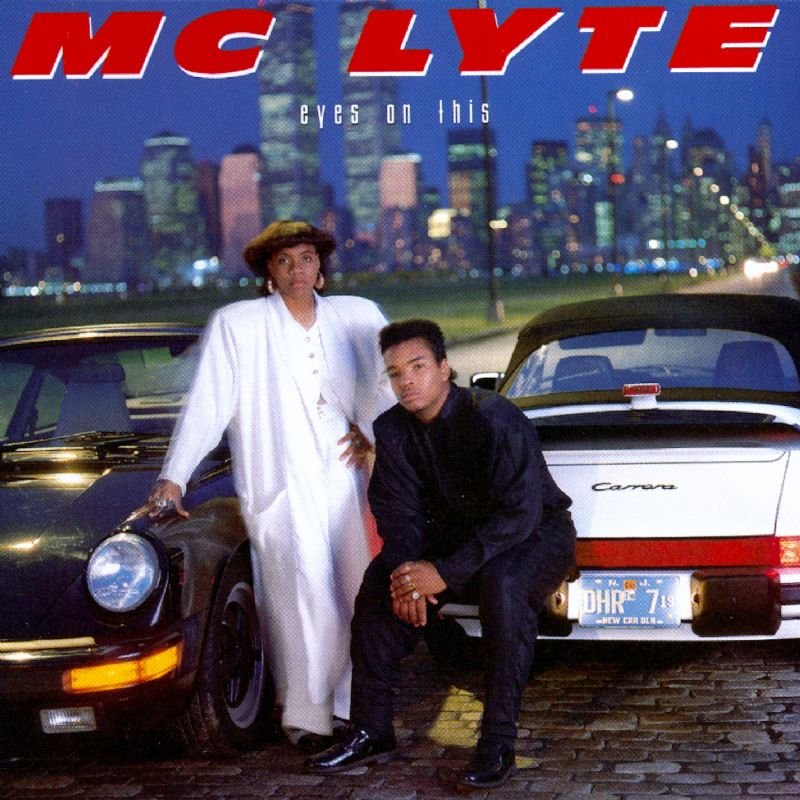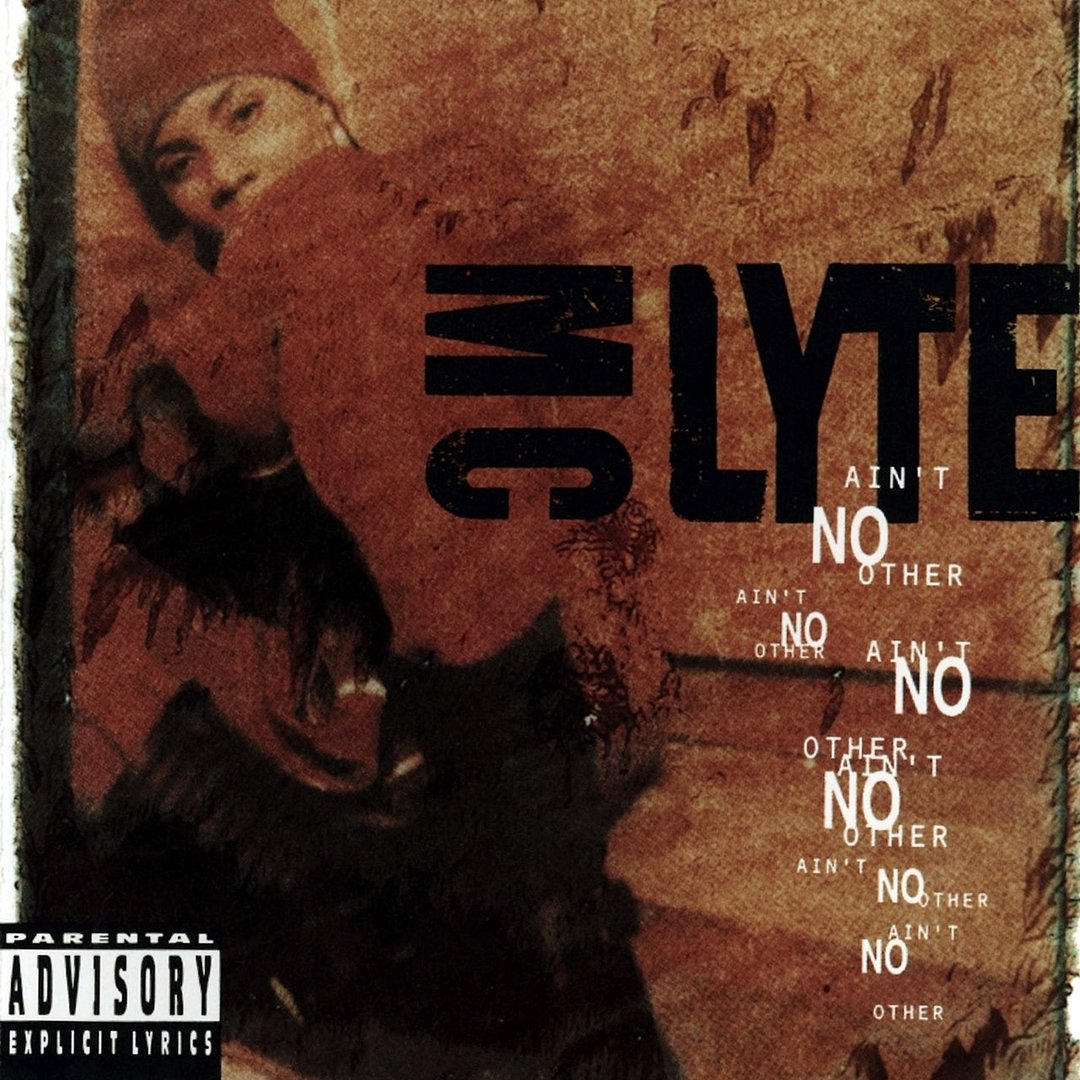Happy 35th Anniversary to MC Lyte’s debut album Lyte as a Rock, originally released September 13, 1988.
In the 2020s, women emcees rule mainstream hip-hop. But in the late 1980s, few were given their just due. Sure, women had been rocking the mic since hip-hop’s inception, but record labels remained gun-shy about giving these highly skilled artists record deals. Due to a nice big helping of sexism, there was the perception by label executives that women rappers couldn’t sell records, and couldn’t really get a strong foothold in the game unless they were co-signed by men. Roxanne Shanté had Marley Marl and the Juice Crew. Salt-N-Pepa had Hurby Luv Bug. And Lana “MC Lyte” Moorer had Audio Two and the First Priority Family.
MC Lyte definitely deserved to stand on her own. Rocking the mic since high school, she stood shoulder to shoulder with some of hip-hop’s best during her career. Lyte as a Rock, her debut album, was released 35 years ago and still sounds as good as it did three-and-a-half decades ago. Lyte demonstrates tremendous verbal ability on Lyte as a Rock, using her husky voice and conversational flow to create wicked rhymes to go along with the neck-snapping beats.
Like her step-brothers Kirk “Milk Dee” and Nat” Gizmo” Robinson a.k.a. Audio Two, the Brooklyn-raised MC Lyte cut her teeth in the ultra-competitive New York club scene during the mid to late ’80s, commanding respect in spots like the Latin Quarter and Union Square, even while still in high school at the time. Her step-father, Nat Robinson, Sr. released her single, “Cram To Understand U” through his First Priority label in 1986, when she was a mere 16 years old. Soon after, Audio Two’s “Top Billin’” started to receive serious burn in the clubs. When the elder Robinson was negotiating with Atlantic Records to distribute First Priority, he presented Audio Two and MC Lyte as a package deal; they couldn’t sign one without the other.
Lyte as A Rock shares a lot in common with Audio Two’s debut LP What More Can I Say? (1988). Both Lyte and her stepbrothers share a fondness for stripped-down drum heavy production and overall album brevity; both Lyte as a Rock and What More Can I Say? clock in at a little under 40 minutes.
That being said, Lyte as a Rock feels like a complete album, while What More…?, as dope as it is, always felt like an extended EP. Also, since Lyte is a better emcee than Milk Dee, the production on Lyte as a Rock is a bit more straightforward, creating an ideal soundscape for Lyte to deliver her raw raps. Some of the differences in production styles between the two albums come from the fact that Lyte used multiple producers throughout Lyte as a Rock. Though Audio Two handled creating most of the beats, labelmates King of Chill/The Alliance and a young Prince Paul lend their talents behind the boards as well.
Lyte attempts to prove her lyrical dominance straight out the gate with “Lyte as a Rock,” the album’s second single. Over the drums and organ from Tommy Roe’s “Sweet Pea,” Lyte transmits directly from the Planet of Brooklyn, exhibiting complete mic dominance. As she raps, “The grace as I ease across the stage / Bars around the audience, sort of like a cage / They laugh, cause they assume I'm in prison / But in reality, they're locked in.” The song would later receive a house remix that was used for the video version, but I prefer the more rugged original recipe.
Watch the Official Videos:
Much of Lyte as a Rock is about Lyte declaring her lyrical skills, as she expresses on “I Am Woman,” “Lyte Thee MC,” and “Don’t Cry Big Girls.” “MC Lyte Likes Swingin’” stands out due to Prince Paul’s busy production. Over scratches, filtered vocals, various horn samples, and shifting drum breaks, she states her case for why she’s the ideal party rocker.
Though Lyte proves extremely capable at delivering braggadocio raps, she’s hardly a one-trick pony. In fact, her first single and the song that continued to influence her career was “I Cram To Understand U,” Lyte’s story of her misadventures with an ex named Sam, who “had the head like that of a clam.” Over a solid drum-track she describes the increasingly shady and erratic behavior of her boyfriend, only to eventually discover that he’s in fact addicted to crack cocaine. The song does effectively convey the feelings and thoughts that one goes through as they slowly discover that someone they love isn’t who they say they are. For Lyte, there’s some denial and acceptance, but mostly a lot of anger.
“Paper Thin,” the album’s third single, is one of the best hip-hop breakup tracks ever recorded. Hell hath no fury like Lyte scorned, as she lambasts an ex that she discovered cheating on her. She derides him for taking her feelings for granted, rapping, “’Cause I hate when one attempts to analyze / In fact, I despise those who even try / To look into my eyes to see what I am thinking / That dream is over you gotta sink in.” She reiterates her strength and independence by assuring those that she has no intentions of ever using men for their money, flying in the face of the way many women were portrayed in hip-hop tracks throughout the ’80s, ’90s, and, if we’re being honest, today.
The beat to “Paper Thin,” produced by King of Chill, is put together from the intro guitar solo from Prince’s “17 Days” and drums from Al Green’s “Glad You’re Mine.” Much like Audio Two’s “Hickies On My Neck,” the song plays as a combined vocal and instrumental version, with the dubbed out version of the song repeating after Lyte kicks all of her verses.
Throughout her career, MC Lyte has always excelled at recording dis tracks. On Lyte as a Rock she unleashes her first and perhaps best with “10% Dis,” her extremely harsh assault on the rapper Antoinette. The first shot fired in this battle came from Antoinette’s end, on the song “I Got an Attitude,” the lead-off track from producer Hurby Luv Bug’s compilation The House That Rap Built. After Antoinette rapped over a beat that had many similarities to Audio Two’s club smash “Top Billin’” (both songs were based around the drum break for The Honey Drippers’ “Impeach the President”), Lyte opted to unload on her in response.
MC Lyte deliberately dissects Antoinette with a mixture of cold calculation and contempt throughout six verses. Lyte calls out her opponent for both mimicking Audio Two’s production style and, lyrically, for biting Rakim. Though Lyte later admitted that she never even knew Antoinette, she, in her words, thought of the worst things she could think to say to her. Lyte added that the song’s title came from the idea that they only used 10% of what they came up with.
Though Lyte has said that “10% Dis” was “just business,” she sure raps like its personal. Her barbs cut deep as she declares, “Thirty days a month your mood is rude / We know the cause of your bloody attitude” and “Here’s a Milkbone, a sign of recognition / Don’t turn away, I think you should listen close / Don’t boast, you said you wasn’t bragging / You fucking liar, you're chasing a chuckwagon.” Lyte goes particularly hard at Antoinette for not being a genuine emcee, asserting “Others write your rhymes while I write my own / I don’t create a character when I'm on the microphone / I am myself, no games to be played / No script to be written, no scene to be made.”
The beef between the two continued through Antoinette’s two albums and Lyte’s sophomore album Eyes on This (1989), which contain the similarly brutal “Shut the Eff Up (Hoe)” and “Slave 2 the Rhythm.” Lyte later alleged the two did eventually battle on stage at the New York club The World, contending that she won the encounter.
Enjoying this article? Click/tap on the album covers to explore more about MC Lyte:
“Kickin’ 4 Brooklyn” features some of the unique production styles developed by Audio Two. The pair put together a spare ode to the borough where they and Lyte were raised. Lyte kicks a slower flow over a simple bassline backed by fluttering snares and vocal samples in the place of kicks. The song makes a distinct impression in less than two-and-a-half minutes.
This was the first entry in a solid and successful career for Lyte, proving Atlantic’s reluctance to sign her look utterly ridiculous. She remains “herself” throughout the album, as defiant and confident as any other emcee to ever pick up the microphone. And it’s this confidence and sheer skills that carry Lyte as a Rock and makes it as memorable as any album in the formative era of hip-hop.
LISTEN:
Editor's note: this anniversary tribute was originally published in 2018 and has since been edited for accuracy and timeliness.



